7天,9项可持续发展技术,3个切实可行的方案,“孟加拉减贫挑战营”用科技实现可持续发展。
今年1月,由上海交通大学密西根学院创业教育中心(以下简称JI-CFE)的Sam Ro(卢承哲)博士领导的“孟加拉减贫挑战营”项目团队访问了泰国及孟加拉国,探索通过科学技术与学校中所学的知识来帮助当地合作伙伴,为农村和城市社区贫困人带来切实可行的解决方案,通过科技来实现经济和社会的可持续发展。
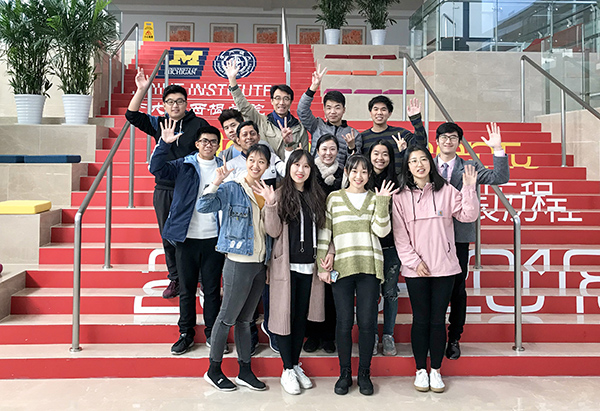 孟加拉挑战项目参与师生合影
孟加拉挑战项目参与师生合影
“孟加拉减贫挑战营”孟加拉减贫挑战营是依托上海交通大学“全球挑战计划”和可持续发展技术创业项目(TESD)的一部分,该项目也是JI-CFE主任Pradeep Ray教授领导的“一带一路”(mHBR)移动健康项目的延伸。挑战营旨在依托学校国际处对外合作资源基础,依托学院与各欠发达国家的科研合作关系,发掘、培育、开拓项目,与当地联动。项目旨在通过实地探究实践,让学生通过发展第一手经验了解国际社会问题融入多元文化,思考并解决人类发展共同面临的问题,培养学生“人类命运共同体”的责任意识和家国担当,体现国际化的“价值引领”。团队成员跨越本、硕、博三个阶段,由来自密西根学院、机动学院、生物医学工程学院、电信学院、物理学院、媒设学院、法学院等跨学科、跨年级、跨国家的多元化团队组成。
充分的准备
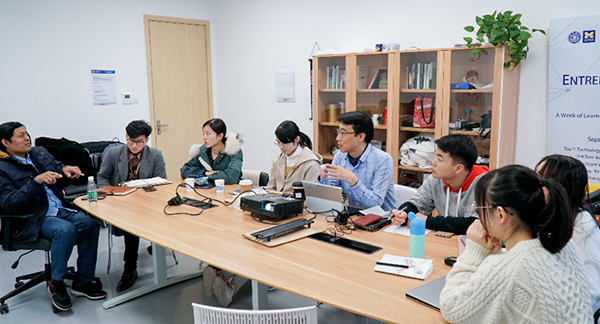 Sam Ro博士在周例会上与同学们讨论
Sam Ro博士在周例会上与同学们讨论
孟加拉国是世界上人口密度最高,最不发达国家之一。全国划分为达卡、吉大港、库尔纳、拉吉沙希、巴里萨尔、锡莱特和朗普尔7个行政区;工业以原材料工业为主,包括水泥、化肥、黄麻及其制品、白糖、棉纱、豆油、纸张等;重工业薄弱,制造业欠发达。“挑战营”将前往孟加拉国首都达卡、北部重镇博格拉、第一大港口城市吉大港进行实地调研。
2018年12月至2019年1月底间,成员们在Sam Ro博士带领下进行了十一次培训,培训内容十分丰富,涵盖了:孟加拉国语言及文化;合作方信息收集及了解;团队成员任务分配及行前准备等多方面内容。经过培训,团队成员更好的了解了孟加拉减贫挑战营的宗旨,充分做好了行前的知识储备。
充实的行程
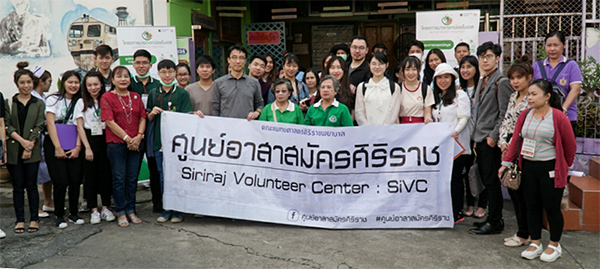 项目组与Bankok Noi工作人员合影
项目组与Bankok Noi工作人员合影
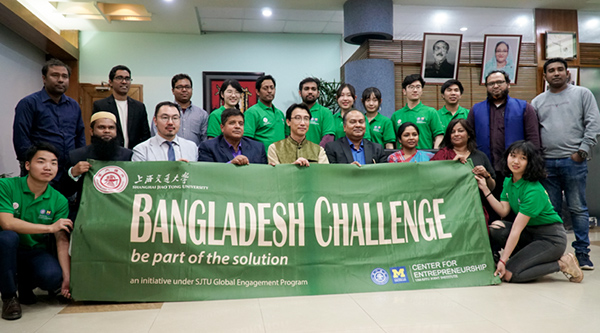 项目组与达卡大学商业研究学院的院长和教职人员合影
项目组与达卡大学商业研究学院的院长和教职人员合影
孟加拉减贫挑战营实地访问了泰国大曼谷地区和孟加拉国4个省份的项目点,详细了解了合作伙伴的工作环境和工作内容,明确了上海交通大学方面可以帮助解决的问题,包括亚洲理工学院(AIT: Asian Institute of Technology,泰国)、泰国移动医疗试点项目Bankok Noi、达卡大学(DU,孟加拉)、孟加拉国政府信息获取项目Access to Information (A2I)国际霍乱研究中心孟加拉分部ICDDR,B((International Cholera and Diarrhoeal Disease Research, Bangladesh)、孟加拉农业发展学院 Rural Develop Academy(RDA)、Grameen乡村绿色能源公司(GS)、尤努斯中心(Yunus Center)、Grameen 通讯(Grameen Communications)。
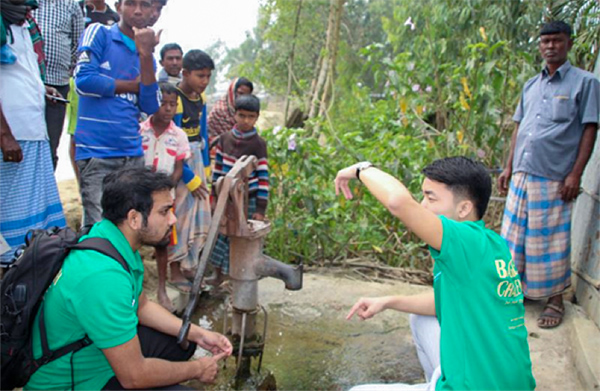 项目组成员在ICDDR实地考察
项目组成员在ICDDR实地考察
成员交流-1-1.jpg) 项目组成员与A2I创新实验室成员交流
项目组成员与A2I创新实验室成员交流
丰硕的成果
孟加拉国挑战团队致力于用科学技术实现可持续发展,特别关注用于减贫的移动医疗技术、信息技术和工业化原型生产。制定了三个立即可行的短期项目和三个合作伙伴的长期项目,加强了现有的七个致力于可持续发展的学术、非政府和政府机构合作伙伴之间的联系。
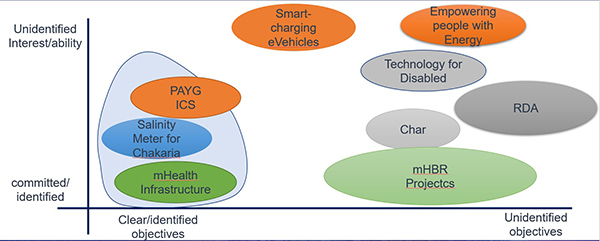 计划概述图
计划概述图
三个切实可行的计划
1) Grameen Shakti乡村绿色能源公司(GS)即付即用液化石油计量表开发
2) 国际霍乱研究中心孟加拉分部ICDDR,B 盐度计开发
3) 移动医疗项目平台开发
长期合作计划
1) Grameen乡村绿色能源公司(GS)电动三轮车快充开发及“通过能量赋能于民(empowering people with energy)“的长远计划;
2) 孟加拉农业发展学院(RDA)农业科技及农业技术培训计划;
3) 达卡大学(DU)利用科技帮助失能人员计划,包括为盲人建立阅读平台和图书馆的开发计划。
受当地合作伙伴的委托,后续可开展的多达9项的可持续发展类技术目前已提上日程。未来在国内方面,团队拟与上海仁济医院和鹿寨人民医院以及中国其他几家对移动医疗感兴趣的科技公司展开合作。国际方面,团队将于巴基斯坦俾路支省和孟加拉国政府研究机构Access to Information(A2I) 间深化沟通和合作。
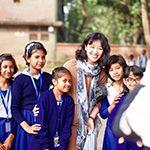 跟随项目,我们拜访了达卡大学,并一路向北到达孟加拉北部农业大区博格拉,和孟加拉国农业发展研究院(Rural Development Acadamy)探索可能的合作方式,我们被请进了博格拉警察局,博格拉大区负责人希望引进快速毒品检测技术,帮助他们打击毒品交易。同时他们非常欢迎中国企业,尤其是医疗健康产业的公司,落地孟加拉国。在一小队带枪警力护送下,我们登上了孟加拉独特的河岸地(char land)。河岸地是是典型的贫穷聚集地,也是孟加拉最贫穷的地区之一,我们实地调研的村庄非常希望我们可以在农业种植技术,医疗与教育方面给他们提供帮助。团队里有来自印尼的Domi和美国的Andy,有医学院的大四实习生,也有物理与天文学院的博士生,随行负责摄影和记录片制作的是媒体与设计学院的鹏程和南加州文化与创意学院的Yushu, 和他们共事,思想交锋对于我这种天天浸泡在实验室的理科生来说是非常宝贵的,我得以了解其他专业的人是如何思考和看待问题,他们有什么样的技术去解决问题,在跟随Sam老师推进项目的时候,我第一次面临并思考团队组织问题,如何分配任务,如何激发每一个成员的主观能动性,和多方交涉,如何站在对方立场考虑问题,权衡利弊。
跟随项目,我们拜访了达卡大学,并一路向北到达孟加拉北部农业大区博格拉,和孟加拉国农业发展研究院(Rural Development Acadamy)探索可能的合作方式,我们被请进了博格拉警察局,博格拉大区负责人希望引进快速毒品检测技术,帮助他们打击毒品交易。同时他们非常欢迎中国企业,尤其是医疗健康产业的公司,落地孟加拉国。在一小队带枪警力护送下,我们登上了孟加拉独特的河岸地(char land)。河岸地是是典型的贫穷聚集地,也是孟加拉最贫穷的地区之一,我们实地调研的村庄非常希望我们可以在农业种植技术,医疗与教育方面给他们提供帮助。团队里有来自印尼的Domi和美国的Andy,有医学院的大四实习生,也有物理与天文学院的博士生,随行负责摄影和记录片制作的是媒体与设计学院的鹏程和南加州文化与创意学院的Yushu, 和他们共事,思想交锋对于我这种天天浸泡在实验室的理科生来说是非常宝贵的,我得以了解其他专业的人是如何思考和看待问题,他们有什么样的技术去解决问题,在跟随Sam老师推进项目的时候,我第一次面临并思考团队组织问题,如何分配任务,如何激发每一个成员的主观能动性,和多方交涉,如何站在对方立场考虑问题,权衡利弊。我对项目的评价是,非常累,非常辛苦,非常精彩,非常值得!
——李涵 (生物医学工程学院)
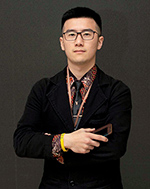 The project was an eye opening and thoughts provoking journey for me. Somehow, I and the other team members, felt like we are travelling back in time, and peeking through the cradle of the rapid development of many advancing and developed countries, as China had been not long ago. The journey also provides a perspective on possibilities of how our know-how in science and engineering, as a student, can be integrated for aiding the economic development and welfare improvement of other countries. During our field study to Bangladesh, due course we had a short layover in Thailand, and learn even more. This project turned out to be more captivating and enchanting than what I can imagine prior to the departure. One that I would like to testify is how remarkable positive changes have brought about by China’s Belt and Road initiative, down to the grassroot citizens of these countries who take part in it. I am grateful for the opportunity to be in the project and hope more amazing outcome can be worked out in the future.
The project was an eye opening and thoughts provoking journey for me. Somehow, I and the other team members, felt like we are travelling back in time, and peeking through the cradle of the rapid development of many advancing and developed countries, as China had been not long ago. The journey also provides a perspective on possibilities of how our know-how in science and engineering, as a student, can be integrated for aiding the economic development and welfare improvement of other countries. During our field study to Bangladesh, due course we had a short layover in Thailand, and learn even more. This project turned out to be more captivating and enchanting than what I can imagine prior to the departure. One that I would like to testify is how remarkable positive changes have brought about by China’s Belt and Road initiative, down to the grassroot citizens of these countries who take part in it. I am grateful for the opportunity to be in the project and hope more amazing outcome can be worked out in the future.
——Dominikus Brian 钟鸿盛 (密西根学院)
 Last year I helped organize the Entrepreneurship Week hosted by CFE and met and learned from many inspiring professors and entrepreneurs regarding social businesses. I witnessed research, pictures, demos, and other forms of evidence of how a social business can be achieved, but all of this became reality when I was fortunate enough to have the opportunity to visit Bangladesh. Working with a diverse set of disciplinary experts, I was able to see and interact with a wide range of social businesses and most importantly I discovered a lot of potential for how I can contribute as both an engineer and an entrepreneur. I hope others can learn, not only the theory, but also learn from the experience of direct application in the field.
Last year I helped organize the Entrepreneurship Week hosted by CFE and met and learned from many inspiring professors and entrepreneurs regarding social businesses. I witnessed research, pictures, demos, and other forms of evidence of how a social business can be achieved, but all of this became reality when I was fortunate enough to have the opportunity to visit Bangladesh. Working with a diverse set of disciplinary experts, I was able to see and interact with a wide range of social businesses and most importantly I discovered a lot of potential for how I can contribute as both an engineer and an entrepreneur. I hope others can learn, not only the theory, but also learn from the experience of direct application in the field.
——Andy Hsiao(密西根学院)
 Before the field trip of Bangladesh Challenge Project, I imagined the situation might be this or that, and by doing this or that I could solve the existing problems, which sounds very heroic, haha. But the fact turned to be that, BC field trip was more like a process of learning. We learned exactly what the challenges were, how Bengalese faced these Challenges and what we could record or innovate. What impressed me most is the model of social business in Bangladesh, very illuminating yet hasn’t been applied in China, which deserves a try.
Before the field trip of Bangladesh Challenge Project, I imagined the situation might be this or that, and by doing this or that I could solve the existing problems, which sounds very heroic, haha. But the fact turned to be that, BC field trip was more like a process of learning. We learned exactly what the challenges were, how Bengalese faced these Challenges and what we could record or innovate. What impressed me most is the model of social business in Bangladesh, very illuminating yet hasn’t been applied in China, which deserves a try.
——曹力元 (医学院)
